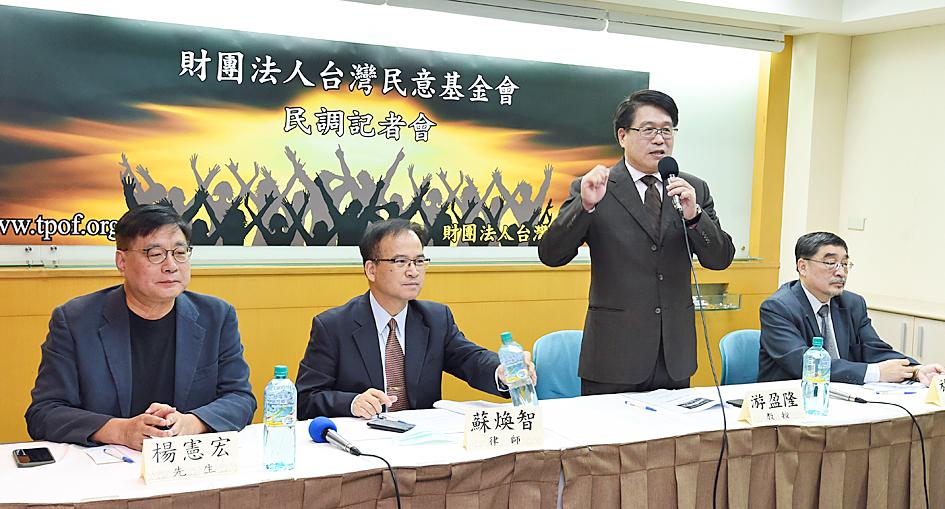Nearly 53 percent of people would not want to see CTi News’ license revoked, a survey released yesterday by the Taiwanese Public Opinion Foundation found.
Asked how they would feel if CTi News had its license revoked and shut down, 28.3 percent of respondents said that it would make them “not very happy” and 24.2 percent said it would make them “not happy at all.”
Meanwhile, 18.3 percent said that it would make them “very happy” and 14.2 percent said it would make them feel “fairly happy.”

Photo: Liu Hsin-de, Taipei Times
Another 15 percent either had “no opinion,” did not know or declined to answer, the foundation said.
Asked whether they believed that the National Communications Commission is an independent agency not influenced by politics, 31.5 percent of respondents said “not at all,” 35.5 percent said “not really,” 16.3 percent said “mostly” and 5.2 percent said “very much,” while 11.6 percent either had “no opinion,” did not know or declined to answer.
Given the complexities of CTi News having its license revoked, it would be a “disaster” if an administrative agency were to handle it as a “simple, administrative procedure,” foundation chairman Yu Ying-lung (游盈隆) told a news conference in Taipei.
If, in the end, the commission and President Tsai Ing-wen’s (蔡英文) administration decide to revoke the network’s license without a convincing reason, they would face a strong public backlash, the foundation said in its report.
The survey also asked respondents about US President Donald Trump’s re-election bid, with 31.3 percent of respondents saying they would be “fairly happy” and nearly 22 percent saying they would be “very happy” to see him elected for another term on Tuesday next week.
Another 17.6 percent said they would “not be very happy” and 13.9 percent “not happy at all,” while 15.5 percent had “no opinion,” did not know or declined to answer, the foundation said.
Thirty-three percent of Taiwanese are “not very worried” and 20.6 percent are “not worried at all” that Taiwan-US relations would regress if former US vice president Joe Biden, the Democratic presidential nominee, were to win the election.
However, 26.6 percent of respondents are “somewhat worried” and 11.6 percent are “very worried.”
The foundation said that 8.3 percent of respondents had “no opinion,” did not know or declined to respond.
Asked which political party they support the most, 33.6 percent of respondents said the Democratic Progressive Party and 16.9 percent said the Chinese Nationalist Party (KMT).
The Taiwan People’s Party and the New Power Party each had 5.8 percent, while the Taiwan Statebuilding Party had 4.4 percent, the survey showed.
Other political parties garnered a combined 2.3 percent of the survey responses, while 29.7 percent of respondents said they did not support a particular party, the foundation said.
The survey, which was conducted on Monday and Tuesday last week, collected 1,080 valid responses from adults in Taiwan aged 20 or older. It has a confidence level of 95 percent and a margin of error of 2.98 percentage points.

US PUBLICATION: The results indicated a change in attitude after a 2023 survey showed 55 percent supported full-scale war to achieve unification, the report said More than half of Chinese were against the use of force to unify with Taiwan under any circumstances, a survey conducted by the Atlanta, Georgia-based Carter Center and Emory University found. The survey results, which were released on Wednesday in a report titled “Sovereignty, Security, & US-China Relations: Chinese Public Opinion,” showed that 55.1 percent of respondents agreed or somewhat agreed that “the Taiwan problem should not be resolved using force under any circumstances,” while 24.5 percent “strongly” or “somewhat” disagreed with the statement. The results indicated a change in attitude after a survey published in “Assessing Public Support for (Non)Peaceful Unification

The CIA has a message for Chinese government officials worried about their place in Chinese President Xi Jinping’s (習近平) government: Come work with us. The agency released two Mandarin-language videos on social media on Thursday inviting disgruntled officials to contact the CIA. The recruitment videos posted on YouTube and X racked up more than 5 million views combined in their first day. The outreach comes as CIA Director John Ratcliffe has vowed to boost the agency’s use of intelligence from human sources and its focus on China, which has recently targeted US officials with its own espionage operations. The videos are “aimed at

SHIFT: Taiwan’s better-than-expected first-quarter GDP and signs of weakness in the US have driven global capital back to emerging markets, the central bank head said The central bank yesterday blamed market speculation for the steep rise in the local currency, and urged exporters and financial institutions to stay calm and stop panic sell-offs to avoid hurting their own profitability. The nation’s top monetary policymaker said that it would step in, if necessary, to maintain order and stability in the foreign exchange market. The remarks came as the NT dollar yesterday closed up NT$0.919 to NT$30.145 against the US dollar in Taipei trading, after rising as high as NT$29.59 in intraday trading. The local currency has surged 5.85 percent against the greenback over the past two sessions, central

‘MISGUIDED EDICT’: Two US representatives warned that Somalia’s passport move could result in severe retaliatory consequences and urged it to reverse its decision Minister of Foreign Affairs Lin Chia-lung (林佳龍) has ordered that a special project be launched to counter China’s “legal warfare” distorting UN Resolution 2758, a foreign affairs official said yesterday. Somalia’s Civil Aviation Authority on Wednesday cited UN Resolution 2758 and Mogadishu’s compliance with the “one China” principle as it banned people from entering or transiting in the African nation using Taiwanese passports or other Taiwanese travel documents. The International Air Transport Association’s system shows that Taiwanese passport holders cannot enter Somalia or transit there. The Ministry of Foreign Affairs (MOFA) protested the move and warned Taiwanese against traveling to Somalia or Somaliland